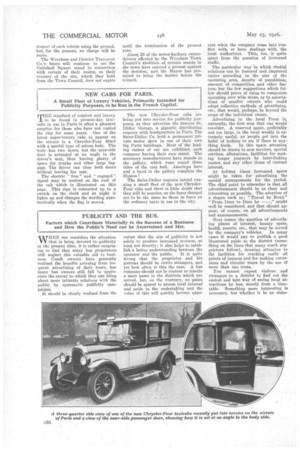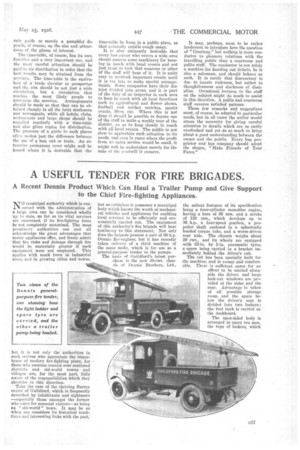PUBLICITY AND THE BUS.
Page 20

Page 21

If you've noticed an error in this article please click here to report it so we can fix it.
Factors which Contribute Materially to the Success of a Business and How the Public's Need can be Ascertained and Met.
WHEN one considers the attention that is being devoted to publicity at the present time, it is rather surprising to End that many bus proprietors still neglect this valuable aid to business. Coach owners have generally realized the benefits accruing from frequent advertising of their tours, but many bus owners still fail to appreciate the extent to which they can bring about more intimate relations with the public by systemtotic publicity campaigns.
It should be clearly realized from the outset that the aim of publicity is not solely to produce increased revenue, at least not directly ; it also helps to establish a better understanding between the
operator and the public. It is quite wrong that the proprietor and his patrons should be entire strangers, and yet how often is this the case. A bus company should not be content to remain a mere name in the districts which are served, but, on the contrary, no pains should be spared to arouse local interest' and pride in the undertaking and the value of this will quickly become appa
rent when the company come into conflict with, or have dealings with, the local authorities. This, too, is quite apart from the question of increased traffic.
The particular way in which ebrdial relations can be fostered -and improved varies according to the size of the operating area, density of population, amount of competition and other factors, but the few suggestions which follow should prove of value to companies operating over wide areas, or to associations of smaller owners who could adopt collective methods of advertising, etc., that would, perhaps, be beyond the scope of the individual owner.
Advertising in the local Press is, naturally, the first step that one would consider. A reserved space, preferably not too large, in the local weekly is extremely useful, as people get into the habit of looking to see if there is any
thing fresh. In this space attention should be drawn to new services, special services, alterations, facilities for making longer journeys by inter-linking routes, and any other items of current interest.
At holiday times increased space might be taken for advertising the special arrangements for the period. The chief point to remember is that all advertisements should be as clear and interesting as possible. The adoption of a slogan such as: "Travel by Road," "From Door to Door by —," might well be considered, and that should appear, of course, on all advertisements and announcements.
Next comes the question of advertising places of interest, beauty spots, health resorts, etc., that may be served by the company's vehicles. In many cases it would pay to publish a good illustrated guide to the district (something on the lines that many coach proprietors follow), drawing attention to the facilities for reaching easily all points of interest and for making excursions and circular tours by the use of more than one route.
You cannot expect visitors and strangers to a district to find out the easiest and best way of seeing local attractions by bus, merely from a timetable. Something more interesting is necessary, but whether it be an elabo rate guide or merely a pamphlet depends, of course, on the size and attractions of the places of interest.
The time-table, of 'course, has its own function and a very important one, and the most careful attention, should be paid to its distribution in order that the best results may be attained from the services. The time-table is the equivalent of a trade circular or prospectus and. the aim should be not just a wide circulation, but a circulation that reaches the most likely people to patronize the services. Arrangements should be made so that they can be obtained cheaply in all the local stationers and newsagents, while all hotels, clubs, restaurants and large . shops should be supplied regularly with a time-table and also given copies for distribution. The presence of a guide in such places often makes just the difference between the use" of a bus, cab or train. An attractive permanent cover might well be Issued where it is desirable that the time-table be hung in a public place, as that naturally entails rough usage.
It is also eminently desirable that every bus owner who covers a wide area should possess some machinery for keeping in touch with local events and not just trust to luck that someone or other of the staff will hear of it. It is quite easy to overlook important events until it is too late to make special arrangements. Some companies have their district divided into areas, and it is part of the duty of an inspector in each area to keep in touch with all local functions such as agricultural and flower shows, football and cricket matches, sports events, Rtes, etc. Where this is not done it should be possible to depute one Of the staff to make a weekly tour of the district, so as to keep closely in touch with ail local events. The public is not slow to appreciate such attention to its needs, and even in cases where the profit from an extra service would be small, it might well be undertaken merely for the sake of the goodwill it ensures.
It may, perhaps, seem to be rather irrelevant to introduce here the question of "Courtesy," but nothing is more conducive to pleasant relations with the travelling public than a courteous and polite staff. The conductor is not solely a machine for handing out tickets, he is also a salesman, and should behave as such. It is rarely that discourtesy is due to innate rudeness, but rather to thoughtlessness and slackness of discipline. Occasional lectures to the staff on the subject might do much to assist in this direction. A polite and courteous staff ensures satisfied patrons.
These few remarks and suggestions must, of course, be adapted to particular needs, but in. all cases the writer would stress the necessity for giving careful attention to details which are so easily overlooked and yet do so much to bring about a good understanding between the owner and the public. Every bus proprietor and bus company should adopt the slogan, "Make Friends of Your Pares."


























































